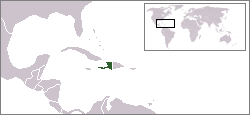This is an old revision of this page, as edited by Drz~enwiki (talk | contribs) at 22:46, 24 February 2004 (added coat of arms). The present address (URL) is a permanent link to this revision, which may differ significantly from the current revision.
Revision as of 22:46, 24 February 2004 by Drz~enwiki (talk | contribs) (added coat of arms)(diff) ← Previous revision | Latest revision (diff) | Newer revision → (diff)
| |||||
| National motto: L'Union Fait La Force (French, Union Makes Strength) | |||||
 | |||||
| Official languages | French, Creole | ||||
| Capital | Port-au-Prince | ||||
| President | Jean-Bertrand Aristide | ||||
| Area - Total - % water |
Ranked 143rd 27,750 km² 0.7% | ||||
| Population - Total (Year) - Density |
Ranked 92nd 7.5 million (July 2003) 271/km² | ||||
| GDP - Total (Year) - GDP/head |
$10.6 billion (2002) $1,400 | ||||
| Currency | Gourde (HTG) | ||||
| Time zone | UTC -5 (no DST) | ||||
| Independence - Declared - Recognised |
(from France) January 1, 1804 1825 (Fr), 1863 (USA) | ||||
| National anthem | La Dessalienne | ||||
| Internet TLD | .ht | ||||
| Calling Code | 509 | ||||
Haiti is situated on the western third of the island of Hispaniola in the Caribbean Sea, east of Cuba. A former French colony, it was one of the first countries of the Americas, after the United States, to declare its independence. Its capital is Port-au-Prince.
Haiti is the poorest country in the Western hemisphere and has been plagued by political violence and corrupt dictators for most of its history. Over three decades of dictatorship followed by military rule ended in 1990 when Jean-Bertrand Aristide was elected president. Most of his term was usurped by a military coup d'etat, but he was able to return to office in 1994 and oversee the installation of a close associate to the presidency in 1996. Aristide won the 2000 presidential elections, which were boycotted by opposition groups. Protests against the government have continued since then, and have recently become more violent.
About 80% of the population lives in abject poverty. Nearly 70% of all Haitians depend on the agriculture sector, which consists mainly of small-scale subsistence farming and employs about two-thirds of the economically active work force. The country has experienced little job creation since President René Préval took office in February 1996, although the informal economy is growing. Failure to reach agreements with international sponsors have denied Haiti badly needed budget and development assistance.
In 2000, Aristide was elected in a process some claim was rigged. Resentment over this and widespread corruption boiled over on February 5, 2004, when a armed rebel group calling itself the Revolutionary Artibonite Resistance Front took control of the Gonaïves police station. This rebellion then spread throughout the central Artibonite province by February 17 and was joined by opponents of the government who had been in exile in the Dominican Republic.
From the CIA World Factbook 2000 and the U.S. Department of State website. Not Wikified.
- History of Haiti
- Geography of Haiti
- Demographics of Haiti
- Politics of Haiti
- Economy of Haiti
- Communications in Haiti
- Transportation in Haiti
- Military of Haiti
- Foreign relations of Haiti
See also: Haitian Creole, Music of Haiti